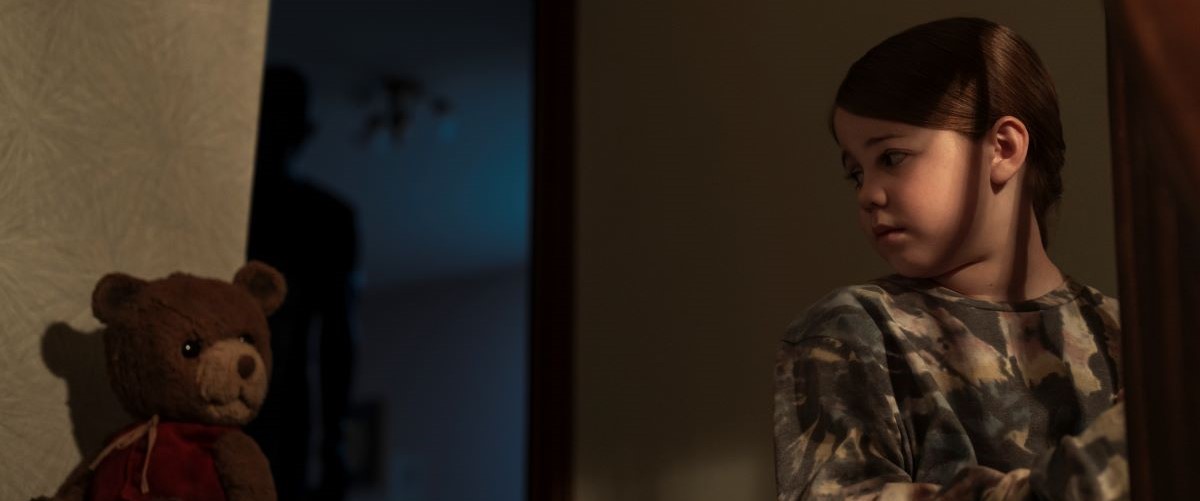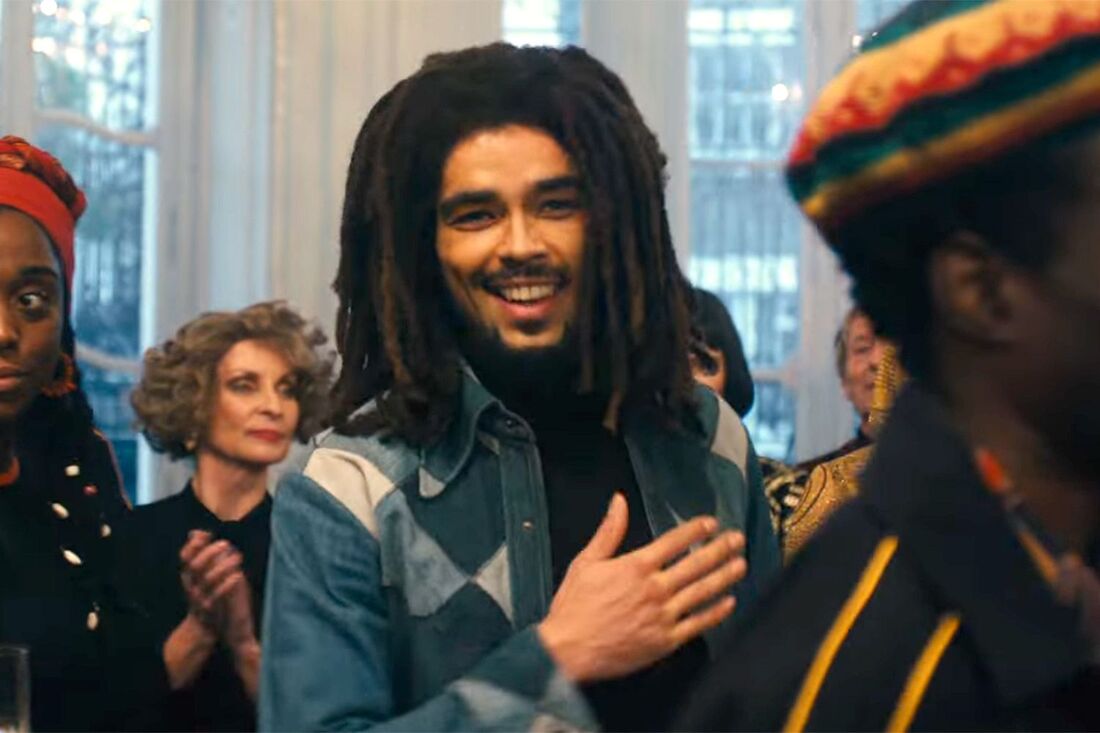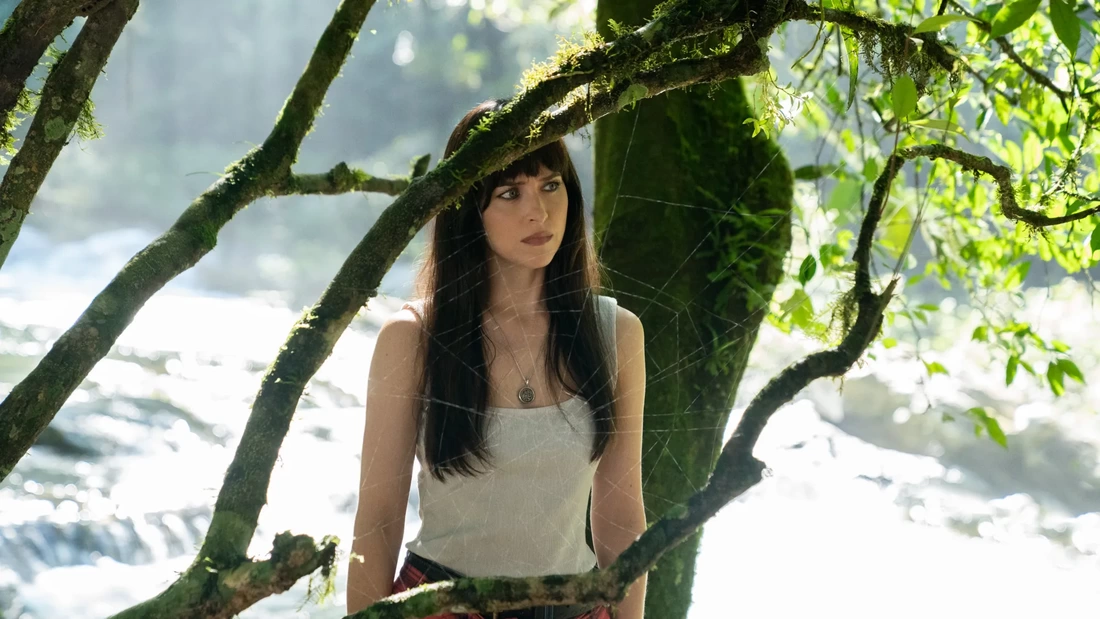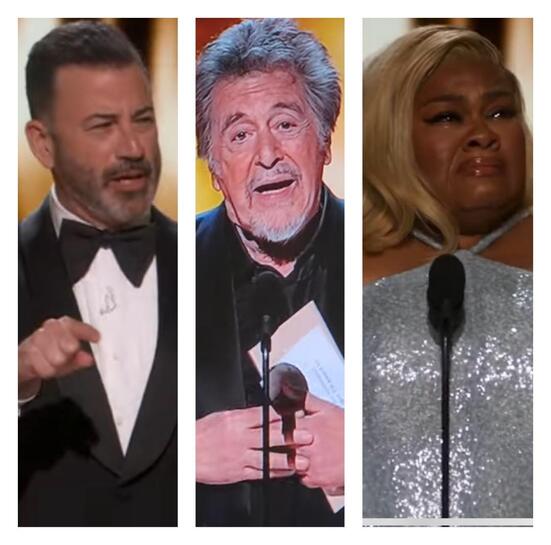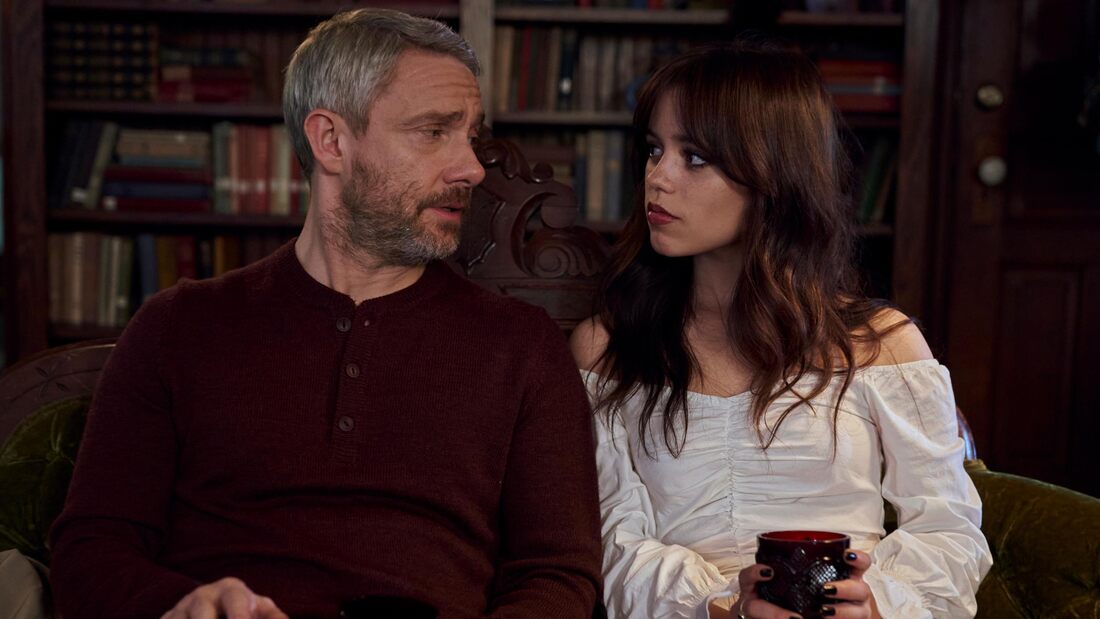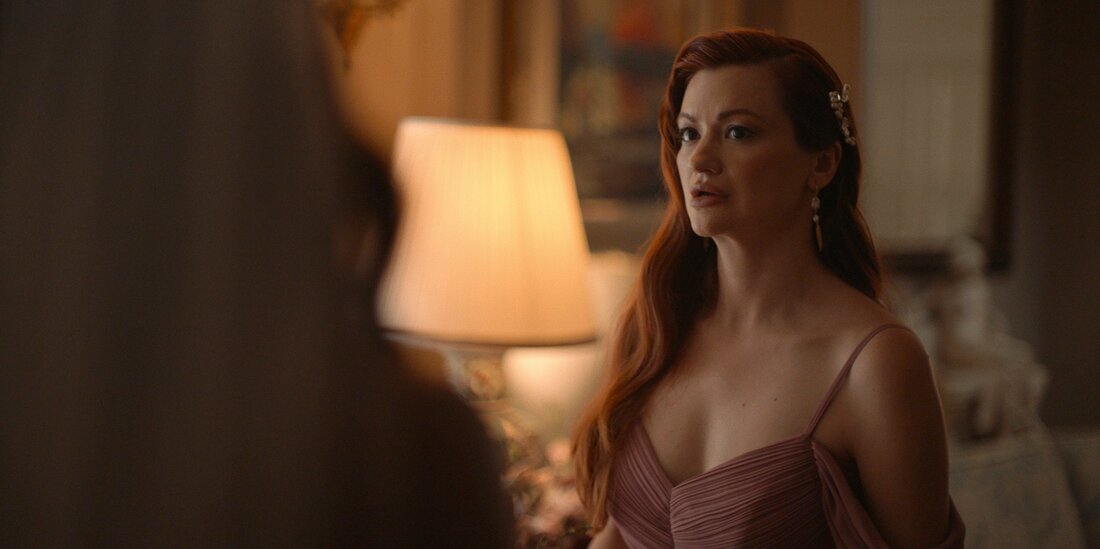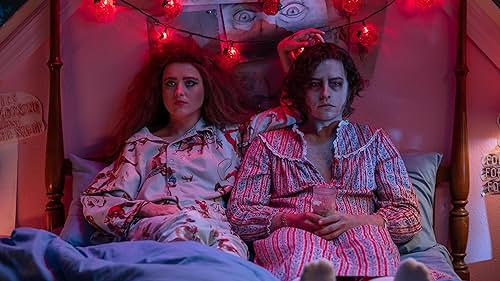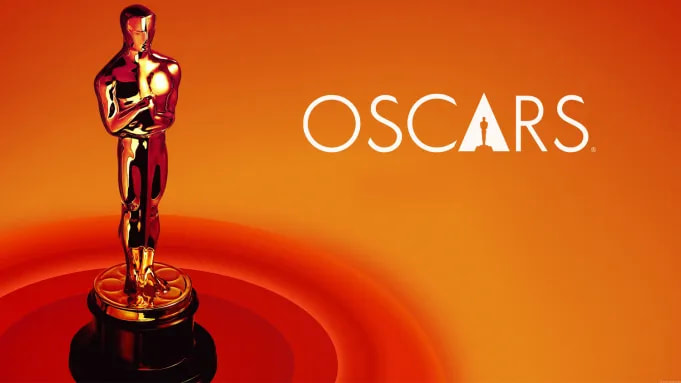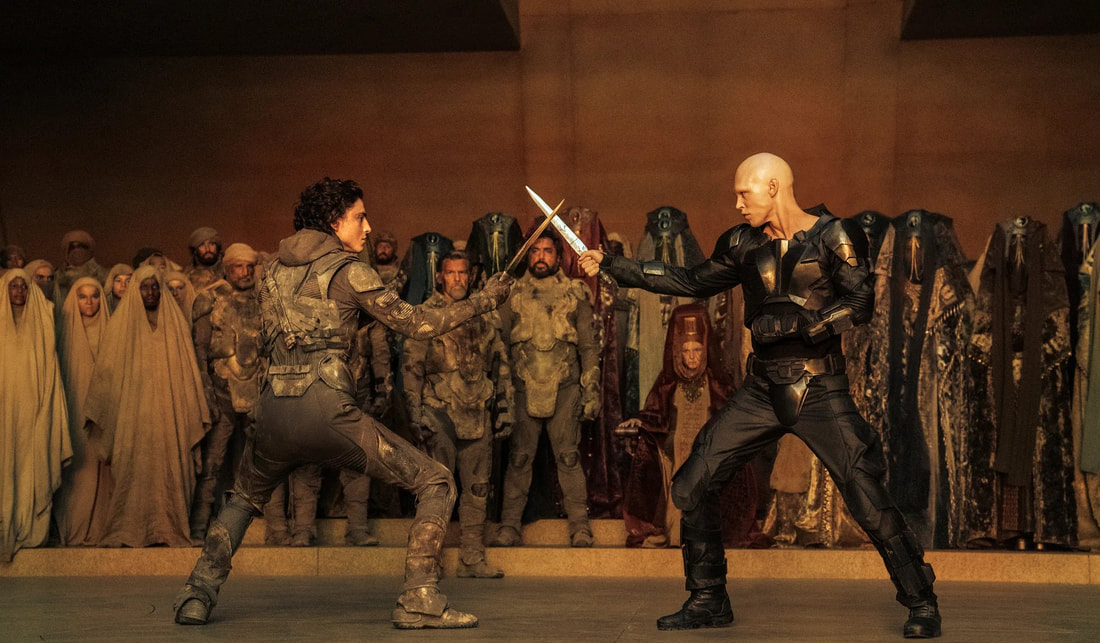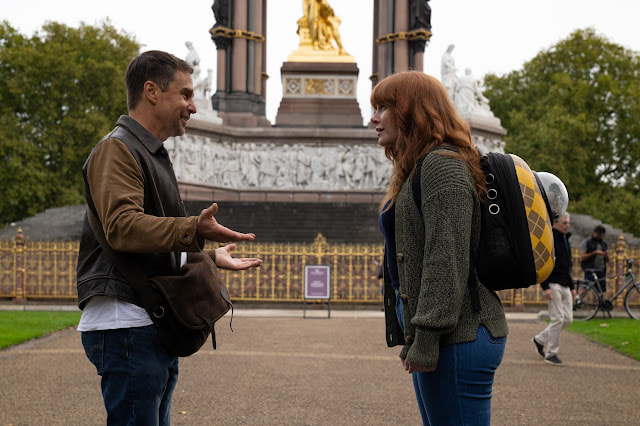|
by Philip Price Director: Jeff Wadlow Starring: DeWanda Wise, Tom Payne & Betty Buckley Rated: PG-13 (some violent content, drug material & language) Runtime: 1 hour & 44 minutes It needs to be said up front that “Imaginary” is not really a good horror film and that Jeff Wadlow (“Truth or Dare,” “Fantasy Island”) may not be a good filmmaker. He may be a great guy and a pleasure to work with, but a good director? Doesn't seem to be the case. I say this not to be rude and not because half an hour into his latest Blumhouse release the only other people in my theater - a couple in their early to mid-twenties - walked out, but because “Imaginary” functions first as a very obviously constructed movie. That is to say, it makes no qualms about existing in an artificial world where dialogue is just that and the only purpose of sets are in service to the story and not necessarily to implant us into the world of these characters. This is fine enough for some genres and maybe even more forgivable in the horror genre as the audience is aware of the function these characters and their heightened situations are in fact in service of, but Wadlow either doesn't know how to or is unaware he needs to sustain a consistent tone throughout for as soon as Betty Buckley's kooky old lady character enters the picture it's as if the fourth wall breaks and it is made strikingly clear the difference in the contrivances that make a movie and how the honesty of a performance can make or break a viewer's investment. The screenplay from Wadlow, Greg Erb and Jason Oremland does that thing where a movie does what it thinks a movie is supposed to do but can't tap into why genre movies like the one they're attempting to make work. Horror movies come to be remembered for their scares (of which “Imaginary” has very few) but first leave their imprint on audiences because of the character's journey and the mental or physical exhaustion they are put through on the part of the antagonist. This is where “Imaginary” has potential as I'm sure Wadlow, Erb and Oremland (or at least one of them) intended for the story to be some large allegory for childhood suffering and derangement and certainly the abandonment many face in many forms yet despite the ambition nothing is propelling the narrative forward. What we are instead served is a string of scenarios in which another childhood icon is ruined thanks to a scary movie. Fortunately for teddy bears, the movie’s Chauncey isn't kitschy enough to be camp and Wadlow's moviemaking isn't good enough to render the themes authentic meaning we land somewhere in the middle with a movie that operates on earnest horror tropes but has none of the levels or layers to make it remotely memorable. What ultimately ends up pushing the movie more to the positive side for me (and I feel this will be very unique to each person) is the final act of the film venturing into the “Kingdom of our Imagination” that looks like something out of an MC Escher painting and is just wild enough to have rendered me intrigued. I don't know if I understood all the rules or knew what was going on at every turn. Still, I appreciate its practicality in design (Chauncey at one point morphs into something that looks like Rahzar from “Teenage Mutant Ninja Turtles II: The Secret of the Ooze”) and its peculiarities throughout. In addition, Pyper Braun gives a legitimately tortured child performance that hedges the movie in that direction of authenticity before it is immediately upended by a perfectly campy line about ventriloquism which just perfectly encapsulates both everything funny about “Imaginary” and also why it doesn't work at all. I love a scene when an old person or historian explains the mythology of an antagonist or evil entity though, and this movie has two solid examples of such.
2 Comments
by Philip Price Director: Reinaldo Marcus Green Starring: Kingsley Ben-Adir, Lashana Lynch & James Norton Rated: PG-13 (marijuana use & smoking, some violence and brief strong language) Runtime: 1 hour & 47 minutes While it would be easy to say that, if nothing else, “Bob Marley: One Love” works as an introduction to Marley, his music and the context from which it came for young or new fans even that faint praise isn’t really true. We are dropped into 1976 (after no less than four text cards) as Marley’s nation of Jamaica is rampant with political upheaval. The People’s National Party and the Jamaican Labour Party fight for control of the country, but neither of these opposing sides is given distinctions by the film’s screenplay which comes from no less than four screenwriters including director Renaldo Marcus Green (“King Richard”) and Terence Winter (“The Wolf of Wall Street”). The point, of course, is that Marley’s mission was to bring these opposing political leaders together, but for audience members uninitiated in ‘70s Jamaican politics (like myself) there is very little indication of what the bullet point positions of these parties even were and worse, there are no indications as to where Marley himself fell. We understand Marley desires peace, we understand he is devout in his Rastafari faith, but there is no depth to these beliefs or desires. Further, one can feel the film skirting the penetration and profundity such insights might provide around its titular subject. The music is good, obviously, and is frankly enough to keep the Wikipedia-level story afloat if not consistently engaging, but it’s depressing that an artist whose album – the making of which is chronicled in the film - was named the best album of the 20th century by TIME magazine in 1999 doesn’t get a biopic that at least feels in tune with what that artist stood for, if not also genuinely trying to shape who he was. How this film manages to make even Lashana Lynch seem dull is beyond me and signals just how weak so many other areas of the film have to be to allow for this travesty. by Philip Price Director: S.J. Clarkson Starring: Dakota Johnson, Tahar Rahim & Sydney Sweeney Rated: PG-13 (violence/action & language) Runtime: 1 hour & 56 minutes Contrary to popular opinion, the chief issue with “Madame Web” is not how badly it's executed or how egregiously awful it is in general, but more how offensively boring it is. For what is presumably a superhero origin story this movie - which clocks in at four minutes short of two full hours - feels like little more than a first-act set-up until maybe the final 20 minutes. There are stakes, things are happening, and we're invested in the characters to the same extent we are strangers in Walmart who we hope to make it home safely, but there is nothing here to suggest any of what transpires on screen is effective at anything besides causing an existential crisis. Beyond the expected complaints of obvious plot holes (of which there are plenty) and terrible dialogue, the film’s more fascinating fumbles are that of Tahar Rahim's entire performance being voiceover and/or ADR, his choice to wear no shoes on the subway and Dakota Johnson's very Dakota Johnson ramble about how her mom died during childbirth smack dab in the middle of Emma Roberts’ baby shower. If this were simply a ‘90s-set drama about a woman who demonstrates signs of being clairvoyant in what she believes are keys to unlocking and understanding her long lost mom then this would still be a Lifetime-level movie, but it might have stood a chance at being more compelling than “Madame Web” ends up due solely to all the spider stuff this film is forced to include. There is no “Spider-Man” in this movie per se as Rahim’s Ezekiel Sims only first appeared in the comics two years before when this film is set, but outside of this character complicating both his own life, Johnson’s Cassandra Webb's life, and the lives of the other three young, future spider-women featured in this film the only main concern this antagonist made me consider was, “If this guy’s body lets out a neurotoxin would the government lady he seduced early in the film to get access to technology not yet invented in 2003 not have been dead long before he purposefully poisons her or does the toxin only come out of his hand and not any other specific orifices? Are condoms neurotoxin resistant?” Maybe that was it. The point is, Sims could have easily been written as a Max Cady-like baddie if we’re shooting for the Lifetime synergy and I would have much preferred that schlocky kind of genre storytelling (terrible ADR and all) to this waste of resources in service to nothing more than desperate market forces. by Julian Spivey Director: Simon Cellan Jones Starring: Mark Wahlberg, Simu Liu & Ukai Rated: PG-13 (language) Runtime: 1 hour & 30 minutes If there ever was a real-life story made for a Hollywood story it was that of Arthur, a wounded stray dog in Ecuador who befriended a team of adventure racers on their challenging 435-mile race through the jungles and mountains of South America. “Arthur the King” changes a lot of the small things in this story – the setting, the year, the nationality of the characters (some understandable, some not so much but without impact on the story) – but what it doesn’t change and gets 100 percent right is the heart of the story … Arthur and the lives he changed. The film, directed by Simon Cellan Jones, opens with veteran adventure racer Michael Light (played by Mark Wahlberg), as an Americanized version of Swedish adventure racer Mikael Lindnord, leading his team to a disastrous finish in an adventure racing event because of his hubris and inability to listen to his teammates, including Leo (played by Simu Liu), who captures Michael’s failure for his massive social media audience to see. A few years later, Michael isn’t taking well to the life of a non-athlete and convinces his wife, sponsors and a set of new teammates to one last opportunity at glory for an upcoming race in the Dominican Republic, the film’s stand-in for Ecuador (because it’s where it was filmed). He teams with Olivia (played by Nathalie Emmanuel), a promising mountain climber who’s only doing it to please her sick father, Chik (played by Ali Suliman), an all-time great adventure racer who’s been let go by his team due to a knee injury, and at the demand of the new sponsors because of his massive social media following Michael is forced to reunite with Leo. We’ve seen this story before. It’s a Cinderella sports story about a team that isn’t supposed to have a chance at glory but ultimately does through hard work and teamwork. What sets it apart is Arthur’s courageous and unbelievably heartwarming story. It doesn’t seem for the first quarter or so of the film that Michael is going to let anything come between him and attempting to win the race, but in Arthur (played by Ukai), who first crosses his path at a checkpoint within the race and is given a meatball by Michael, he ultimately finds a companion in his struggle to succeed through the pain and the elements. Michael and his teammates can’t understand how this injured dog has gone so far in this event after meeting up a long way away from their initial meeting (and I don’t think Lindnord ever figured this out in real life). The joke is that he must have wings. If you don’t know how the story ended in real life I won’t ruin it for you. Ultimately, this is a story about the bond of a man and a dog, who seem to see a kinship in each other. “Arthur the King” is exactly the type of movie this story should be – heartwarming and made with a sure hand. It doesn’t try to be more than it’s not and thankfully (as it would’ve been easy to do) doesn’t delve into cheese and schmaltz, which is likely a testament to Michael Brandt’s script. Some reviews you’ll see will knock the film for “pulling at your heartstrings” or being “manipulative.” But if the courageous and amazing story of Arthur doesn’t pull at your heartstrings I’d have to wonder if you even have a heart. We shouldn’t dock films simply for provoking emotion from an audience. The performances by Wahlberg and the cast are all solidly played as they should have been. There’s no over-acting or put-upon dramatics. “Arthur the King” is a breezy, 90-minute film that will make you want to look into the real story it’s based on as soon as you leave the theater. It’s the kind of film you should want to spend an easy Spring afternoon or evening with. by Julian Spivey Worst Moments 5. Early Start Time The Academy Awards decided to start the ceremony one hour earlier than usual this year at 6 p.m. (CST) instead of 7 p.m. (CST) and I might be the only person who wasn’t a fan of this. I haven’t seen much, if any complaining about the earlier start time, although host Jimmy Kimmel did make a joke about people expecting the Oscars to begin at 7 p.m. and missing the first hour. I guess I’m in the minority but I’d rather the show run later into the evening than begin earlier, as it just fits my schedule better. Also, it just seems weird for ABC to use the biggest night in the film industry as a lead-in promotion for a new episode of a sitcom. I love “Abbott Elementary,” but in some ways going from the best in film to a network TV sitcom just seems wrong. 4. Predictable Winners If you pay attention to the film industry awards circuit as I do you may find yourself bored with the actual awards come time for the biggest of the film industry because you’ve mostly seen the same winners before at ceremonies like the Golden Globes, Critics’ Choice Awards, Screen Actors Guild Awards and others. Seeing Da’Vine Joy Randolph and Robert Downey Jr. win every single honor can become tiring even if I admit they were the rightful winners of the award. I’m certainly not advocating for surprising wins or participation trophies just for the sake of entertainment. The only real way to fix this is something we’re probably not going to see. It would take the Academy agreeing to push the Oscars to the beginning of the year, say in mid-January, and essentially forcing all of the precursor awards to take a back seat and schedule after. I just don’t ever see this happen. So, if you follow along with the movie awards you’re probably going to be a cinch to win your office Oscars pool yearly. 3. Al Pacino Announces Best Picture You would’ve thought the Oscars would’ve learned after the Warren Beatty and Faye Dunaway debacle seven years ago that it might not be the best idea to place an octogenarian in the spotlight to announce the evening’s biggest winner of Best Picture. Al Pacino, the 83-year-old acting legend, may not have screwed the pooch as badly as the “Bonnie & Clyde” duo did but it was still an awkward moment as he went straight to opening the Best Picture envelope and announcing “Oppenheimer” as the winner without announcing the nominees. I do wonder if that might have been the plan because the Best Picture nominees were all profiled throughout the evening but even if that’s the case – and it probably wasn’t – it’s still unorthodox. I understand wanting to honor the legends of the medium and don’t want to disrespect the greats or sound ageist but at some point the Academy is just opening itself and these legends to embarrassment. Why not try to get a slightly younger Oscar winner to give out the big award like say Brad Pitt or Julia Roberts next year? 2. In Memoriam My most common complaint over the years about award shows has been screwing up the In Memoriam segment and once again it appears high on my list. It’s so easy to screw up the In Memoriam segment. Anything that comes across as being disrespectful to the legends of the medium who have died in the years since the last ceremony. The most common way to do it is by focusing on the artists performing whatever song has been chosen as the In Memoriam song instead of what the main focus of the segment should be those deceased legends. And the Oscars In Memoriam this year is one of the most disrespectful I’ve ever seen. Not only did the segment focus too much on performers Andrea and Matteo Bocelli, but the camerawork was atrocious as it was so far from the stage and the screen with the names and faces of the departed you needed a magnifying glass to make out some of the names. The In Memoriam segment should also be the easiest of the night to get right. All we’re asking for is the faces and names of those artists we love and admire on the screen. We don’t even need a live performance. The orchestra playing something lovely in the background is all that would be necessary. 1. Stunts This was the dirtiest, most pandering, placative moment of the entire show and I immediately felt bad for an entire segment of the film industry during it. Emily Blunt, Best Supporting Actress nominee for “Oppenheimer,” and Ryan Gosling, Best Supporting Actor nominee for “Barbie,” had just given one of the best back-and-forth presenter moments of the evening taunting each other about how “Oppenheimer” was racking up the most awards and how “Barbie” was the most-watched film of 2023 at the box office before they turned to do what they were there for in the first place – pay tribute to the movie stunt community. The telecast then showed a montage of celebrated stunts from more than 100 years of movies. What’s the problem? Stunt coordinators don’t have their category at the Academy Awards despite many years of lobbying to add one. So, this essentially amounted to the Academy Awards honoring the “unsung heroes” of cinema that they don’t feel are worthy of winning Oscars. If the Academy truly wants to pay tribute to stunt men and women then give them their category. Because this kind of “stunt” was disgusting in its patronage. Best Moments 5. Jimmy Kimmel the Modern Oscars GOAT Host The 96th annual Academy Awards on Sunday night was the fourth hosting gig at the event for ABC’s late-night talk show host and comedian Jimmy Kimmel and the show is old hat to him by now. He’s a well-oiled machine as the Oscars host. He’s funny and doesn’t pull punches when necessary and doesn’t hit below the belt when it’s unnecessary. He’s affable and seems to be generally liked by the A-list celebrities within the audience and when a moment comes live during the show that might be unexpected, like former President Donald Trump trashing him on social media mid-show, he’s able to handle it with aplomb. Hosting the Oscars has to be one of the toughest gigs annually on TV and Kimmel makes it look easy time and time again. 4. Cord Jefferson’s Acceptance Speech One of the evening’s most pleasant wins went to Cord Jefferson the writer-director of “American Fiction” for Best Adapted Screenplay for the film which adapted author Percival Everett’s 2001 novel Erasure. It’s nice to see Jefferson win for his directorial debut and hopefully, this will begin a successful film career. He’s already had a successful television writing career with credits on “Master of None,” “The Good Place” and having won an Emmy for “Watchmen.” The best part of his acceptance speech came when he encouraged Hollywood to give new creatives a shot. He said: “I understand this is a risk-averse industry. I get it. But $200 million movies are also a risk, and it doesn’t always work out, but you take the risk anyway. And instead of making one $200 million movie, try making 20 $10 million movies.” Amen. Maybe now that the big-budget superhero trend seems to be in a major downward spiral Hollywood might look to these young creatives with interesting stories to tell. 3. Da’Vine Joy Randolph’s Acceptance Speech If there was one lock for any actor to win an Oscar on Sunday night it was going to be Da’Vine Joy Randolph for her excellent performance as school cook and grieving mother Mary Lamb in director Alexander Payne’s “The Holdovers.” She had won just about every possible precursor leading into Hollywood’s biggest night. That still didn’t hush the impact of her acceptance speech where she said: “For so long, I’ve always wanted to be different. And now I realize I just need to be myself and I thank you. I thank you for seeing me.” I’ve always enjoyed Randolph in all of the little roles I’ve seen her in over the last few years, many of which have been on television, and I’m thrilled she got this major chance. I hope the big opportunities keep on rolling for her. 2. John Mulaney’s 'Field of Dreams' Bit There are a few things that would seem to be antithetical to having a smooth awards ceremony. You don’t want the show to run too long, but you also want to be entertained and laugh. It would be so easy to help the length of the show by not allowing the presenters to do comedy bits – and in the case of Melissa McCarthy and Octavia Spencer on Sunday that would’ve been wise. But one bit I was an absolute sucker for was John Mulaney’s comedy bit on the 1989 sports/fantasy film “Field of Dreams,” one of my all-time favorite films (and a past Best Picture nominee!). It was during his presentation for Best Sound, which I honestly had to look up because I’d already forgotten and ended up being the funniest moment of the entire telecast for me. It was a great audition for the future host of the Oscars if ABC and Kimmel ever want to go different ways. 1. Oscar Winners Announcing Oscar Winners My favorite moment of the Oscars on Sunday was something the awards have done in the past, but not for a while, in having past winners of the acting categories show up to announce the nominees for this year. Traditionally, the previous year’s winner of the category would show up to announce all of the nominees (and all four acting winners from last year were a part of the ceremony this year). It was sweet seeing 20 former winners congratulate and speak highly of the 20 acting nominees this year and welcome four more winners into the club. This is something I would love to see the Academy Awards adopt as an annual tradition – even if it likely adds to the running time of an already long show – but I realize how hard it must be to ensure 20 past winners show up every year to enable such a thing to happen. What did you think was the Best & Worst moment of the 2024 Academy Awards? by Philip Price Miller's Girl I appreciate how deeply unserious writer/director Jade Halley Bartlett is with everything that makes up her feature debut, “Miller's Girl,” but a solid title screen and terrible Southern accents do not an erotic thriller make (I did like the title screen though, forreal). Admittedly, this does a really good job of playing up the tensions of its situation without getting too heady about itself while still existing within its schlocky genre confines - something last fall's “Fair Play” didn't balance as well. I don't know if this is necessarily the better film, but I certainly had more fun with “Miller's Girl.” Then again, I'm a sucker for FreeForm dramas aimed at teenagers that offer cheap thrills and trashy kicks. Like, I didn't watch the “Pretty Little Liars” spinoff series that ran on HBO Max, but I imagine this is exactly what that feels like. Shout out to Gideon Adlon for the Electric Six reference and Bashir Salahuddin for being a real stand-out. And while Jenna Ortega certainly seems to have an attraction to material about the "sexual anesthetization of a culture that's super-saturated with pornography and the inefficacy of romantic dogmas on young people's expectations" there is no inexorable attraction between Martin Freeman's charisma and this kind of material. So many of my man's line readings feel out of sync with what the character's thoughts and intentions should be. Or maybe I just can't stop picturing him without those hairy feet. While Freeman's Jonathan Miller may be characterized as too timid to ever actually go after or accomplish what he wants/desires, at least Bartlett shoots for the stars here, going so far as to have Ortega say words like, "Is this what it is to be an adult, the same exquisite longing of adolescence, but with the burden of constant accountability?" while also having Freeman and her film reach their climax simultaneously. Seriously, love the title card though. Font and all. Scrambled Leah McKendrick, as both a performer and creator, seems to have a great mix of mainstream ideology that allows her to not paint herself as a target of criticism despite also feeling unique enough in her execution to make her both funny and memorable. It's not an (over) easy line to walk and while audiences probably won't leave “Scrambled” wanting to be like or be with McKendrick's character of Nellie Robinson, they will appreciate the journey largely due to McKendrick's ability to command tone both in her performance and the movie as a whole. An interesting testament to my generation's tendencies to delay the standard societal expectations much longer than in the past while simultaneously addressing the ties we still naturally feel to those traditions and expectations. Yes, it wraps everything up a little too neatly in the end especially considering we're supposed to buy that Clancy Brown had any semblance of an arc up until his last scene, but I appreciate the intent here - it has bigger ambitions than it might seem - and I appreciate the spotlight on what a suckfest it is for a woman to either be given injections or in the case of Nellie, inject themselves with hormones to stimulate healthy egg development among many other steps with the idea that one day they might fulfill what is a dream for some and a hope for others. It would have also been nice if Henry Zebrowski had a full circle moment here, but now I'm just trying to turn this into a rom-com when that's so clearly not the point of the film's intent that I like so much. by Philip Price Director: Zelda Williams Starring: Kathryn Newton, Cole Sprouse & Liza Soberano Rated: PG-13 (violent content, bloody images, sexual material & assault, teen drinking & drug content) Runtime: 1 hour & 41 minutes In 2010 Entertainment Weekly editor Kate Ward called M. Night Shyamalan’s 2008 film, “The Happening,” the “funniest movie about mass death I had ever seen.” Cut to 14 years later and “Lisa Frankenstein” may be the funniest movie about murder I’ve ever seen. The difference? The humor in Zelda Williams' (daughter of Robin) directorial debut is completely intentional. Even better is the fact the wacky tone and slasher-centric storylines were completely unexpected from a movie sold as a YA love story between a modern girl and a long deceased dude about how they could never truly be together. Diablo Cody, the writer of “Juno” and “Jennifer’s Body,” has cultivated a specific enough brand one could guess the tone from simply hearing the premise, but while this Tim Burton-inspired love story initially settles us into its suburban expressionism by way of the more gothic tendencies of its heroine, it completely turns itself over at the halfway mark and becomes all the more absurd and exciting for it. It's not hard to see this catching on down the road (I was the only person in my 7:30 showing on opening night) whether it be on streaming or somewhere like FreeForm (it's a great Friday night FreeForm movie for 15-year-olds) from the perfect title screen, a truly magnificent Kathryn Newton, to the very specific and patterned way in which the dialogue and blocking compliment the tone and humor it is all working together yet somehow isn't reaching peak performance level. It's not overstimulating, it's not trying too hard as Isabella Summers’ original score is as sparse as it is whimsically melancholy, and the film's casual nature contrasts nicely with its kooky plot devices. What's not appealing, right? One would be forgiven for thinking a film with all of this going for it would be an automatic member of the "Timeless Sleepover Movies" club yet there is something at the center that restricts it from feeling complete; an obvious Frankenstein-esque story where the parts are ironically greater than the sum. There's so much to like about this though, whether it be Cole Sprouse (giving a nearly wordless performance) and his stinky green tears or Carla Gugino just having an absolute blast as well as breakout Liza Soberano who plays Newton's supportive yet totally superficial stepsister Taffy that it's impossible to hold what doesn't work about the film against what does. If nothing else, this marks Williams as having real potential once she works out how to better channel inspiration into motivation and flesh out something she can truly call her own. The ability to mix the glib with the more earnest aspects of Cody's screenplay is a bigger testament to Williams and her cast’s talent than it might initially seem but is ultimately the key to what holds this creature together even if it sometimes seems as if it's only by a string - literally and metaphorically. by Julian Spivey It has never been easier to watch the films nominated for Best Picture at the Academy Awards before the Oscars telecast as it has been the last few years with the proliferation of streaming and video on demand being easier than ever before. So, if you missed out on some or many of the Best Picture nominees and are using the days leading up to the 96th Academy Awards this Sunday, March 10 here are the ways you can watch all 10 Best Picture nominees. The 96th annual Academy Awards will air on ABC and stream live on Disney+ at 6 p.m. American Fiction “American Fiction,” writer/director Cord Jefferson’s film about a frustrated African American novelist (played by Best Actor nominee Jeffrey Wright) who writes an outlandishly stereotypical satire of “black books” and hits it big, has been one of the Best Picture nominees hardest to find for folks who weren’t lucky enough to see it at their local cinema. It’s probably because it’s the most recent release of the 10 nominees and hasn’t hit V.O.D. yet. The easiest way right now to watch “American Fiction” is to be lucky enough to have it still playing at a local theater or you can purchase it currently on Amazon Prime Video for$14.99. “American Fiction” will be available to stream for MGM+ users (I know, not the most popular streamer) on Friday, March 8 (two days before the Oscars). I’ll probably use the free trial option for MGM+ via Amazon Prime Video this weekend to see it. I imagine renting via V.O.D. services on that date might also be available. Anatomy of a Fall “Anatomy of a Fall,” Best Director nominee Justine Triet’s crime-thriller starring Best Actress nominee Sandra Huller as a woman who must prove her innocence following the unexpected death of her husband, is currently available to rent via Amazon Prime Video, Vudu, AppleTV+ and YouTube for $5.99. It will be available to stream on Hulu on March 22 if you’re already subscribing to that streamer and don’t want to spend any more money, but unfortunately that does you no good if you’re hoping to watch before the Oscars this weekend. Barbie Director Greta Gerwig’s “Barbie” was the highest-grossing movie at the box office in 2023, so the odds are if there’s a Best Picture nominee that you’ve already seen it’s this one. However, if you haven’t yet seen “Barbie,” starring Margot Robbie and Best Supporting Actor nominee Ryan Gosling, before Hollywood’s big night you can stream it via Max or rent it for $5.99 wherever you watch V.O.D. The Holdovers “The Holdovers,” director Alexander Payne’s dramedy about a professor (Best Actor nominee Paul Giamatti), teenage student (Dominic Sessa) and school cook (Best Supporting Actress frontrunner Da’Vine Joy Randolph) stuck over the winter break at a New England prep school, is currently streaming on Peacock. “The Holdovers” can also be rented for $5.99 wherever you watch V.O.D. Killers of the Flower Moon Director Martin Scorsese’s three-and-a-half-hour epic about the horrific Osage killings in Oklahoma in the early part of the 1900s is nominated for 10 Oscars, including Best Director for Scorsese, Best Actress for Lily Gladstone (the first ever nomination in the category for a Native American) and Best Supporting Actor for Robert De Niro. “Killers of the Flower Moon” is currently streaming on AppleTV+ and it can be purchased for $19.99 on Amazon Prime Video. Maestro Director Bradley Cooper’s “Maestro” might be the most accessible of all 10 Best Picture nominees because it’s streaming on Netflix, which remains the most popular streamer by far in the country. The film stars Cooper, who’s nominated for Best Actor, as American composer Leonard Bernstein and his relationship with his wife Felicia, played by Best Actress nominated Carey Mulligan. “Maestro” is a Netflix exclusive so if you don’t subscribe and want to see it you’re out of luck. Oppenheimer “Oppenheimer,” director Christopher Nolan’s epic about J. Robert Oppenheimer who was tasked with building the atomic bomb and later spoke out against its usage, was nominated for 13 Oscars, including Best Director, Best Actor for Cillian Murphy, Best Supporting Actor for Robert Downey Jr. and Best Supporting Actress for Emily Blunt. “Oppenheimer” is expected to be the big winner on Oscars night. Seeing as how it was the third highest-grossing film at the box office in 2023 there’s a good chance you’ve already seen “Oppenheimer,” but if not it’s currently streaming on Max and can be rented for $5.99 wherever you watch V.O.D. Past Lives Director Celine Song’s quiet, contemplative look at relationships “Past Lives” is one of the reasons why having 10 Best Picture nominees is such a great thing for film. It’s a small film that may have been passed upon in past years but belongs among any list of the best of the year. The film stars Greta Lee as a woman who immigrated to the U.S. from South Korea when she was a child and finds herself navigating between two men she loves. “Past Lives” is streaming via Paramount+ and can be rented for $5.99 wherever you watch V.O.D. Poor Things “Poor Things,” director Yorgos Lanthimos’ Frankenstein-esque tale of a young woman, played by Best Actress nominated Emma Stone, brought back to life by an unorthodox scientist, has also been one of the harder Best Picture nominees to check out before the Oscars due to its later release date. If you haven’t been lucky enough to see “Poor Things” in theaters it will begin streaming on Hulu on Thursday, March 7 three days before the Oscars. It's currently available for purchase for $12.99 on Amazon Prime Video and hopefully will be available on V.O.D. later this week, as well. The Zone of Interest “The Zone of Interest,” Best Director nominee Jonathan Glazer’s dispassionate look at a Nazi concentration camp commandant who lives just outside of the camp with his family and strives to build a dream life while Hell is just inside the gates, is probably the priciest of all of the Best Picture nominees at the moment, only being available for purchase for $19.99 wherever you watch V.O.D. The film might also be at a local cinema if you’re lucky enough to live somewhere where the cinema will play an arthouse foreign language film with dark themes. by Philip Price Director: Denis Villeneuve Starring: Timothee Chalamet, Zendaya & Rebecca Ferguson Rating: PG-13 (strong violence, some suggestive material and brief strong language) Runtime: 2 hours & 46 minutes We tend to like our space operas with well-defined heroes and villains. Whether it be ‘Star Wars’ or the latest incarnation of ‘Power Rangers,’ the line between nobility and corruption is made clear whether it be through direct action or the color scheme of the costumes. Hell, even in something as sophisticated as Denis Villeneuve's two Dune adaptations, the heroes are largely surrounded by pure, white sands while the villains literally dip themselves in black goop. What is immediately striking about “Dune: Part Two” is how it continuously questions its mythology. While the whole of ‘Dune’ is essentially a story of heroes and villains in a race for ultimate power and control through the ultimate commodity, what it is actually about (the films, anyway) are the power, control, influence and questions the presence of a messiah manifest. In Villeneuve's first “Dune” film Timothée Chalamet's Paul Atreides was a boy born into a destiny beyond his understanding. What makes ‘Part Two’ the more complex, interesting and arguably more epic of the two films is both Paul's understanding of and ultimate embrace of this destiny that has been prescribed to him his entire life. In the first film, Paul's father (Oscar Isaac) tells him, "A great man doesn't seek to lead; he is called to it." In ‘Part Two,’ we see that calling play out as Paul is guided in his decisions - through both dream-like visions as well as his mother (Rebecca Ferguson) parlaying a prophecy into as much of a reality as she can - to the point there is hesitation in Paul's actions, a sincerity as Zendaya's Chani sees it, that makes him question whether seeing this prophecy through or putting a stop to it altogether is the better decision for the universe as a whole. There is, of course, much more going on around Paul, the Fremen people and the planet of Arrakis on which they reside that factor into Paul's deliberations, but for as much time as “Dune: Part One” spent on building the mythology of Frank Herbert's universe it only seemed natural that ‘Part Two’ might then define what makes this mythology, these characters and these worlds worth investing in. Rather, Villeneuve and screenwriter Jon Spaihts (“Prometheus”) spend much of the runtime of this continuation within the ethical questions Paul seeks to (re)solve - questions that could also be applied to the religion and politics of this universe that naturally mirror our own. The result is that by investigating these questions and conflicts the characterizations and significance of what could easily be perceived as pure nonsense do become meaningful as if the attention and care paid to the depth allows for the breadth to sustain itself. In other words, ‘Part Two’ takes the time to delve into these character conflicts against the backdrop of the turmoil within the Harkonnen House and the strategy of the Bene Gesserit while introducing the ultimate powers that be in the Emperor (Christopher Walken) and his daughter, Princess Irulan (Florence Pugh). Villeneuve accomplishes such while not just sustaining but expanding the visual scale and tone established in his first film. Hans Zimmer's score is as epically solemn as Villeneuve and cinematographer Greig Fraser's color palette, but that isn't a backhanded compliment as the stark contrasts in those aforementioned colors representing good versus evil are ultimately heightened to such extremes that the introduction of the film's big bad in Feyd-Rautha (Austin Butler), nephew of the first film’s big bad Baron Harkonnen (Stellan Skarsgård), becomes a full-on black and white sequence. Just as breathtaking as the sweeping sand dunes of Arrakis if not as tactile, this sequence brutally illustrates Butler's embodiment of - if not necessarily evil itself - at least that of Bill Skarsgård's vision of evil (in both voice and appearance, which isn't saying nothing) while arguably being the film's secret weapon. The first, contemplative hour of the film remains with Paul and the Fremen as both he, his mother and the audience are steeped in the ways of the native lifestyle and traditions. Whether directly taken from Herbert's novels or not, the film isn't exactly subtle about its critiques and comments around the politics and beliefs taking place in this universe that (again) equates nicely to our own, but while the propelling of Paul's arc from that of discovering his prophecy to potentially fulfilling it is compelling for a multitude of reasons the idea he is only working against himself and a faceless army of goons the Fremen seemingly dispatch again and again with little effort thanks to their home court advantage inevitably grows a bit stale. The introduction and foreboding presence of Butler's Feyd-Rautha immediately implements momentum this nearly three-hour epic required, pushing both the drama and the scope to substantially higher levels than the first film even aspired to. While much of the engagement with ‘Part Two’ lies in the combination of Paul's smaller psychological drama being played against the visual grandeur of these worlds and cultures Villeneuve and his teams have built from Herbert's words (some of the specificity is insane), there are certainly also broad, straightforward plot points and characters the film doles out to maintain the facade of a huge, crowd-pleasing blockbuster. Again, like comparable space operas, “Dune: Part Two,” even more than its predecessor, is keen to feature this massive ensemble where the likes of Javier Bardem, Josh Brolin, Dave Bautista and Léa Seydoux also show up as chess pieces, making the moves being made all the more appealing. Picking up right where ‘Part One’ left off, Paul and his mother are stranded with the Fremen as the seemingly lone survivors of the House of Atreides. Elsewhere, Baron Harkonnen is fed up with Beast Rabban's (Bautista) inability to control the mining of the spice on Arrakis leading him to the decision to give control of the planet over to Feyd-Rautha. Though Baron is still assumed to be the master manipulator in this game the introduction of Walken's Emperor and possibly even more importantly - his daughter who, like Paul's mother Jessica, was raised by the Bene Gesserit - are the group truly deserving of questioning for why things have begun to unfold as they have. It would be easy to dismiss these characters purely as pawns on the Emperor's board though, even if they amount to that as well. It is the distinction the film makes in proving these characters are more than as much that makes all the spectacle and special effects that much more awe-inspiring. Specifically, Paul's growth and arc while directly dealing with being made to feel like a patsy make for what are the most captivating facets of the film. Paul comes to the Fremen with the inherent idea he is potentially the messiah in this prophecy many of the Fremen faithful believe. ‘Part One’ more explicitly implied Paul as this "chosen one" figure to the point it seemed it was also what the movies wanted the audience to believe. It's not that this is walked back in ‘Part Two,’ but this second chapter adds context to and exposes the systems at play in a way we are made to question if these ancient beliefs are genuine or if they were created more as a means to an end by the powers that be. Paul's internal struggle is also around whether he genuinely believes he can fulfill this prophecy (he seems to want to believe, but can't allow himself to fully buy-in) and whether pretending to fulfill his role in said prophecy will at least afford him to conduct justice for his family and the Fremen against those with more selfish objectives or will squashing the belief in such nonsense as a whole be most beneficial; essentially exposing the Bene Gesserit, the Harkonnens, the Emperor, and any others in positions of power for who they truly are. It is through the presence of Zendaya's Chani - a dissenter who is part of a larger group of nonconformists in the Fremen - and she and Paul's ever-evolving romantic relationship that Paul comes to see the choice he must make all the clearer until it perfectly crystallizes itself in the final, one-on-one showdown between Paul and Feyd for both control over the spice trade and Irulan's hand in marriage. As with most situations involving war, genocide and the exploitation of resources, the right decision always seems clear, yet it is often not chosen in favor of sacrifices and compromises that might lead to a clearer picture and a more promising tomorrow. Deep down, Paul knows which is the honest choice, but he also believes by selling this singular opportunity that he is doing what is best for most in the grand scheme of things. It's honorable, selfless, and in terms of the film - completely engaging - but there is still this lingering feeling that by overlooking the undervalued and seemingly unimportant Paul will miss the aim he seeks to achieve. Needless to say, it will be fascinating to find out what exactly Paul has created and unleashed by committing to his choice, whether he remains a hero or becomes a villain, whether he continues to call the white sands of Arrakis home or begins to dip himself in evil goop when ‘Part Three’ rolls around in a few years. by Philip Price Director: Matthew Vaughn Starring: Bryce Dallas Howard, Sam Rockwell & Henry Cavill Rated: PG-13 (violence and action, strong language) Runtime: 2 hours and 19 minutes I could watch two Channing Tatum movies “The Vow” and “The Lost City” and get this same movie while having a more rewarding viewing experience and I would rather watch two consecutive Channing Tatum movies than ever experience “Argylle” again. That is to say, unfortunately, Matthew Vaughn has officially become a director of diminishing returns. Out of the gate, Vaughn only continued to improve with each of his first five features. In his first (seemingly) original film since 2014 after making three films in the same universe and launching a third franchise with “Argylle” clearly intended to be a fourth (even though that definitely won't happen), it would seem Vaughn has finally hit a career low. While this would seem to indicate he can only go up from here, this winking hodgepodge of a meta-comedy/action caper lets us know early on what we're in for when it becomes clear just how little Vaughn is invested in the construction of the film by the placement of the title card. Why would you not at least save it until after the worst-looking high-speed car chase in history? Written by Jason Fuchs (“Wonder Woman”) and including such classic dialogue as, “You and I, we’re not so different…” it is important to stay aware of the film's intent as “Argylle” unravels (pun fully intended). The point is, that there is no intention or idea outside of being "big" entertainment. Not even pure entertainment because if that were the case this would have been half an hour shorter, but in keeping with the "big" part of being entertaining this is nearly two and a half hours and doesn't need to be. Had they streamlined some of this overly convoluted nonsense it might have resonated simply as entertaining and fun, but it instead becomes a laughable (as in definitely laughing at and now with) slog. Even worse, a lot of the admittedly inventive action set pieces would be really clever and genuinely funny if they didn’t look like complete shit. I just can't understand how Vaughn's modern action sequences are so much uglier than the outright classics he was concocting 10 and 15 years ago? Like, the Leona Lewis bit during the (first) climactic shootout is too much, but I kind of appreciated how big of a swing it was even if it plays more cringy than cheeky. Speaking of musical choices, the use of Patrick Cowley's "Do You Wanna Funk?" is the diamond in the rough here and a perfect backdrop to Sam Rockwell's introductory action scene; setting a promising tone that the rest of the movie is never able to fully deliver on. The Ariana DeBose (who is laughably in this for a cumulative 35 seconds), Boy George and Nile Rodgers collaboration "Electric Energy" is another fun track utilized well as are the Barry White and aforementioned Lewis song even if the sequences they are set to go more and more belly up. None of this is as baffling as the choice to include that new, "thanks to A.I." Beatles track "Now and Then" which was only released this past November but serves as a key plot point in this movie, a movie that wrapped principal photography in January of 2022. Vaughn is not a director who shies away from big swings though, and in the past, this has worked out for him more than it hasn't, but “Argylle” is him losing his edge. He's getting older (he's currently 52) and it's clear what he thinks is cool simply can't keep up with the culture and his level of filmmaking has suffered as a result of the ease modern technology has brought to his doorstep. My guy loves an extreme close-up and is arguably the king of a good transition shot, but while there are a few notable ones here and his style is on full display through the cross-cutting of all the dialogue between Rockwell and Henry Cavill's character as Bryce Dallas Howard's brain plays tricks on her, it is completely undone by the fact we can tell Cavill shot every single one of his scenes for this movie in a single day on the same soundstage. Additionally, the fucking "whirlybird" is a stupid idea with laughably bad execution, but could have passed as a credible, self-aware joke if it was shot like that was the aim. There are strong, quality elements in play within this film ... don't get me wrong. Some of the writing is clever to the point it's begging to be a better movie. For instance, I questioned why our author protagonist's mom (Catherine O'Hara) would have a framed cover of her daughter’s book hanging in her kitchen, but this is accounted for in the multiple reveals the movie plays out. The casting of the 55-year-old Rockwell also feels inspired as he not only plays against type in this actual movie, but against type in the world of the movie itself. “Argylle” almost feels like it gets on track and is full steam ahead when Rockwell eventually shows up yet despite it finding some groove in the latter half of the first act and through the middle it eventually folds in on itself so many times and goes on for so much longer than necessary that the fun this should and wants to inspire simply becomes exhaustion. |
Archives
July 2024
|
